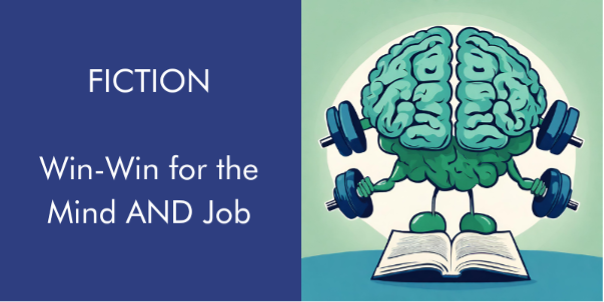When I was a kid, I read everything I could get my hands on.
We stocked up at the library every week. When my parents banned reading books during meals, I read everything on the cereal box at breakfast. My Mum let me read her Catherine Gaskin novels, and my Dad never knew I sneak-read his tattered copy of Harold Robbins ‘The Carpetbaggers’ when I was in primary school.
I was that kid whose parents were unaware she was reading a book under the covers with a torch into the wee hours.
Many of my early reading adventures were not age-appropriate, but my love of fiction has helped me through the ups and downs of life. It’s added pleasure to holidays and been a welcome escape during periods of high stress.
Until recently, I had felt my passion for reading fiction was a guilty pleasure. One that I shouldn’t indulge in when there were so many non-fiction books I knew I should read.
If I started a book that drew me into an unexpected, compelling new world by someone like Robert Jordan, Brandon Sanderson or Raymond E. Feist, I would keep reading until there were no books left to read in the series.
You’ll understand the scale of my challenge if you know there are fifteen books in the Wheel of Time series.
To get through that pile of non-fiction books, I banned myself from my Kindle, my portal to pleasure, for long periods.

However, imagine the smile on my face when I came across research indicating that people who read fiction can be a huge workplace asset.
When we read fiction, the author asks us to imagine what it’s like to be another character, which helps boost empathic skills.
Reading fiction, particularly literary fiction, helps to strengthen critical thinking skills because fiction requires us to keep an open mind over the course of the book. Compare this to many business non-fiction books which can reduce complex concepts to more simplistic ‘this is right, and this is not’ approaches.
Because characters in high-quality literature often hold contradictory but legitimate points of view, readers practice perceiving and acknowledging the value of multiple viewpoints – an essential habit for thriving in complexity.
Reading fiction also builds a tolerance for avoiding cognitive closure.
Psychologist Arie Kruglanski’s studies about the need for closure found that this urge to settle discrepancies and make decisions allows us to get things done and function in the world.
However, that need for closure can cause multiple problems in workplaces high on ambiguity and uncertainty. People with a high need for closure tend to see what makes sense to them based on what they already know and struggle to change their minds as new information becomes available.
However, reading fiction can help with that.
In short, reading fiction exercises a range of cognitive muscles, all of which contribute to our overall emotional intelligence and readiness to face the unknown.
It’s like finding out your favourite hobby also counts as exercise – a win-win for the mind and job!

In a recent ABC article Dr Meg Elkins, a senior lecturer at RMIT University’s School of Economics said avid readers are also more likely to have higher levels of curiosity, another essential habit for embracing the unknown.
If you are a fellow fiction lover, my hope is you now feel you have permission to read for pleasure, knowing you’re building your brain fitness for the workplace at the same time.
If you’re a leader committed to developing people, you may want to explore the emerging benefits of fiction book clubs in the workplace. The good news is literary short stories can be as effective for brain-building as fiction books, especially if they are shared and discussed.
However, you should be aware that Instructor-led sessions have been found to be most effective at creating a psychologically safe environment for workplace participants.
If you still think you’re too time poor to pick up a fiction book, Dr Christine Seifert, professor of communication and author of the Harvard Business Review article The Case for Reading Fiction, said, “We say that we don’t have time to do it. I would say, we don’t have time to not do it.”







